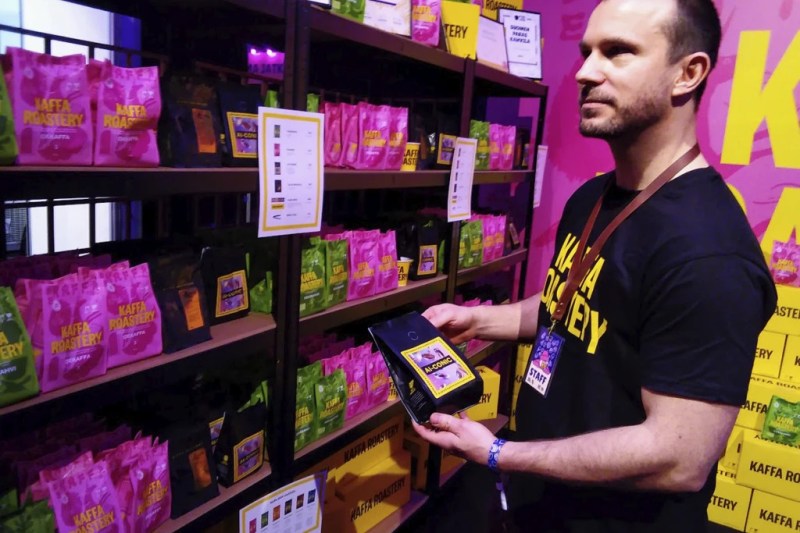Weren’t we just talking about coffee-based sacrilege the other day? Here’s something to make the single-origin bean snobs chew their espresso cups: an artisan roastery in Helsinki is offering a coffee blend created by artificial intelligence called AI-conic. The idea, of course, is that technology will lighten the workload needed to produce coffee.
This is an interesting development because Finland consumes the most coffee in the world, according to the International Coffee Organization. Coffee roasting is a highly-valued traditional artisan profession there, so it stands to reason that they might turn to technology for help.
Just like with scotch whisky, there’s nothing wrong with coffee blends outright. Bean blends are good for consistency, when you want every cup to taste pretty much exactly the same. Single-origin beans, though, are traceable to one location, and as a result, they usually have a distinct flavor based on the climate they’re grown in.
If you’re new to coffee, blends are a nice, safe way to start out. And, interestingly, the AI chose to make the blend out of four different types of beans instead of the usual two or three, despite being tasked with creating a blend that would suit the palates of coffee enthusiasts. But the coffee experts agreed that the AI blend was “perfect” and needed no human intervention. We probably won’t be getting to Finland anytime soon, so if you try it, let us know how it tastes!
Do you like cold brew? How would you like to be able to brew some in just three minutes?
















It seems weird to see LLMs (large language models) being used as mini “brains” when all they do in the simplest terms is predict the next word that must come.
I’m a little worried it’s like letting my cat pick coffees for a blend. Maybe the results aren’t terrible because we all really like coffee?
Maybe the results are terrible, but coffee is in general so terrible that no one can tell the difference.
Different sources/blends and different levels of roasting do matter for personal preferences, since there’s multiple flavors of coffee. But there are a couple of other things that can mess it up even for people who do like coffee, and I think almost all coffee fails at one or the other.
It’s really not any different from what is already done with other natural foods or especially teas.
1) Choose a decent harvest and don’t allow it to go bad or be ruined before you’re ready to have it. (Also, since almost all of a drink is water, don’t use bad tasting water.)
2) When brewing, don’t use the wrong amount of grounds and don’t brew too weak/short or too strong/long. You want to get most but not all of the flavors out of the bean because the first ones are sour and the last ones are bitter.
There’s a bajillion ways to flavor water with a plant, but if you can’t control anything except how much of the plant versus water, it can be tough. If you don’t use enough grounds it can end up bitter because it started dissolving bad flavors once the good flavors were used up. But if you use too much grounds, it can end up sour because no matter how long you brew it for, it’ll never finish dissolving the good flavors. The water can’t hold any more stuff after a point.
If you get that right but the coffee is too weak or strong, well at least you can dilute the strong stuff. I’ll skip grinding because it’s even longer a topic, but that helps you make it brew properly.
Would depend on the roast. Color me skeptical unless they are attempting a Starbucks style coffee. Can you taste the origins there? No, and that’s the point.
Starbucks doesn’t have much choice for coffee, but they have an excellent selection of creme and sugar. Which explains why so many people, even people who used to not drink coffee, love going there.
In other words, randomly mixed coffee tastes as good as the stuff people spend big bucks buying and discussing. The conclusion to be drawn here is that discriminating coffee drinkers can’t taste the differences they think they can.
Do a double blind test, and you’ll find that they can’t tell kopi luwak (https://en.m.wikipedia.org/wiki/Kopi_luwak) coffee from the cheapest crap from the discounter down the street. Like the time they caught all the wine fans out:
https://wine-economics.org/wp-content/uploads/2012/10/Vol.3-No.1-2008-Evidence-from-a-Large-Sample-of-Blind-Tastings.pdf
https://www.realclearscience.com/blog/2014/08/the_most_infamous_study_on_wine_tasting.html
Take a look at the science. There are peer reviewed published papers on coffee tasting. Consumerism has definitely pushed coffee culture too far, but some of it is based on good research.
Kopi Luwak is known to be a scam. An exploitative one at that too. It’s explained in the wiki page you linked too.
Hey I’m not too far away I’m in Switzerland would love to go up and visit Finland I’ve always wanted to check out helsinki’s really interesting high tech waste incinerator that runs so hot that it virtually creates no pollution. An addition I’m on a temporary medical leave waiting and waiting and waiting to get on the surgical schedule so I have a lot of time on my hands I’ll go up and do a story on their coffee and their coffee traditions and AI blend and as well as the super cool wasting generator and ride a couple articles and throw them back at you just give me a ticket and a room maybe a daily eating allowance you don’t have to pay me a thing. AquahhoodJD
Blind test, or every rating on any AI generated thing that was previously made by humans, means absolutely nothing for being heavily influenced by prejudice, in both ways.
Does Finland really love coffee the most or do they have the most hangovers?
I feel somehow challenged, like I should up my coffee intake.
Is part of the AI generated blend Irish Whiskey?